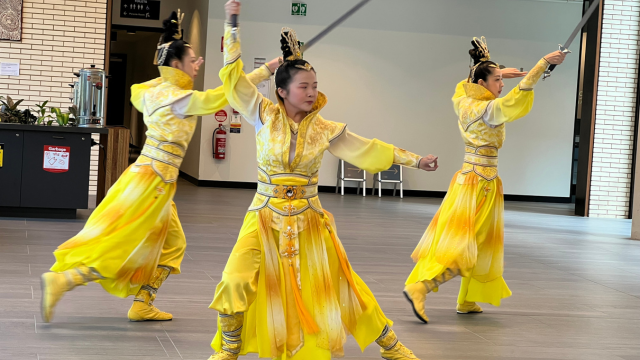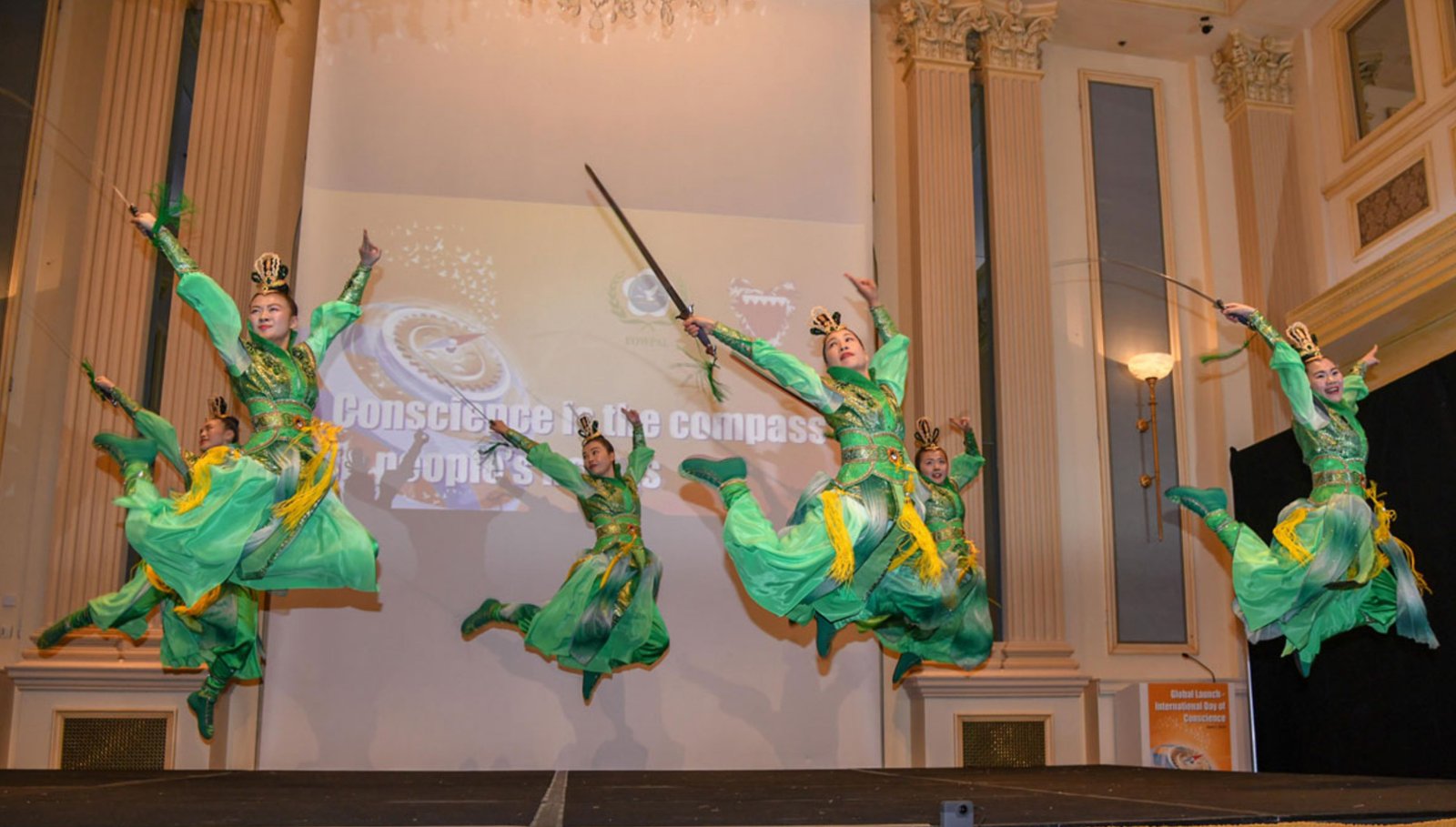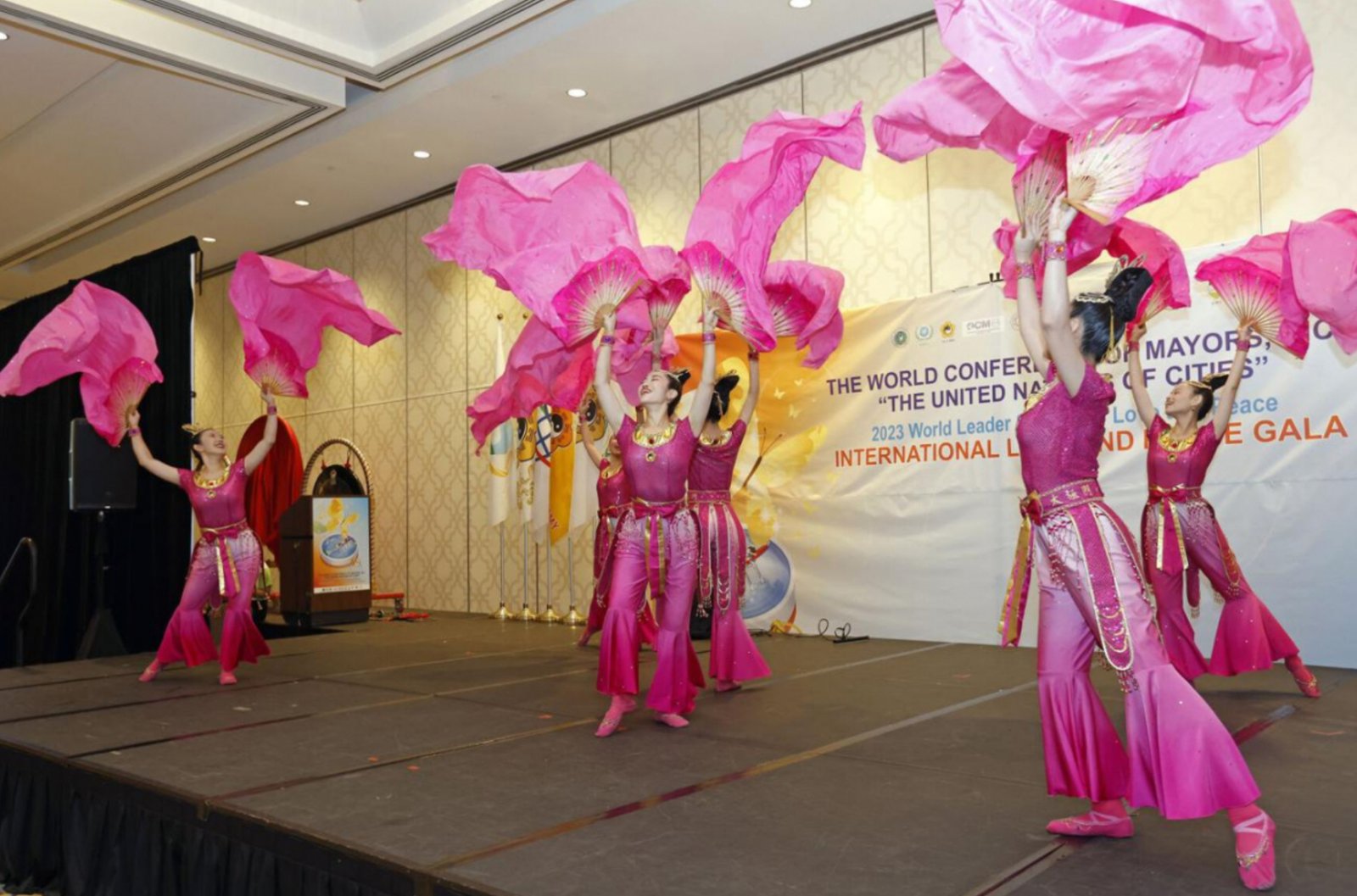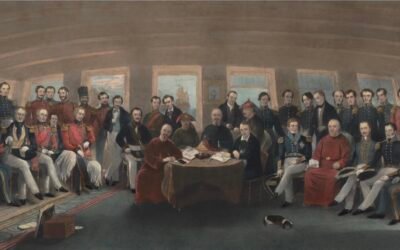The Sword Dance and the Phoenix Dance represent a struggle for justice and peace that strongly resonates with Tai Ji Men’s experience of persecution.
by Samantha Chen*
*A paper presented at the session “Religious Liberty in Taiwan: From the Martial Law to the Tai Ji Men Case” of the Eighth Annual Conference of the European Academy of Religion, Vienna, Austria, July 11, 2025.

Introduction: A 29-Year Journey of Learning
I am a 29-year-old elementary school teacher from Taiwan. In my role, I strive to impart knowledge and sound moral principles to my students. Additionally, I am a member of Tai Ji Men, and its Grand Master (Shifu) is my spiritual teacher.
Tai Ji Men is an ancient menpai (similar to a school) that focuses on Qigong, martial arts, and self-cultivation, passed down through generations from master to disciple. Our Shifu teaches us to reconnect with our conscience, correct our behavior, and perform good deeds to redeem past wrongs. At the same time, we pursue inner cultivation through practicing Qigong, refining our bodies and spirits in search of a harmonious balance between the physical, mental, and spiritual aspects of our lives.
Our Master encourages us to uphold the selfless spirit of martial arts practitioners, sharing the essence of Tai Ji Men’s rich cultural heritage and the true martial arts philosophy of resolving conflict and promoting goodness. Tai Ji Men operates twenty-three academies across Taiwan and North America, with disciples from diverse professions, backgrounds, and nationalities around the world.
Over the years, our Shifu and our fellow disciples have promoted a culture of peace, love, and conscience. We have invited leaders from various sectors to ring the “Bell of World Peace and Love,” sharing messages of harmony and love through wisdom. For his efforts in peace education, our Shifu has received several honors, including the U.S. President’s Lifetime Achievement Award signed by President Joe Biden and the Fedinsieme Global Peace Award and the Flame of Peace Award in Europe.

Moreover, for the past 29 years, Shifu has imparted what we consider to be a special and meaningful lesson through his words and actions.
- The Sword Dance and the Tai Ji Men Case: A Personal Testimony
In 2017, Taiwan hosted the Summer Universiade, and we were invited to perform to inspire all the athletes to push their limits while wishing for their peace and prosperity.
At that time, I participated in the Tai Ji Men Sword Dance performance, which featured 110 sisters. I believe the awe-inspiring righteousness, courage, and perseverance we displayed stemmed from the years of persecution Tai Ji Men faced at the hands of the Taiwan government. Our resistance against injustice provided us with extraordinary energy.
During this session, Claudia Huang will provide a detailed account of the tax dispute between Tai Ji Men and the government and a legal analysis. I will briefly mention two key points from my personal experience and testimony.
First, the dispute arises from a broader, politically motivated crackdown against several spiritual movements in Taiwan that began in 1996. On July 13, 2007, the criminal division of the Supreme Court found Tai Ji Men not guilty of fraud and tax evasion, concluding that we had not violated the Tax Code and owed no taxes.
Despite this, the tax dispute continued to follow us. While the National Taxation Bureau eventually agreed to correct the tax bills for the years 1991, and 1993 to 1996, to zero, it maintained the bill for 1992. Notably, nothing different occurred in 1992 compared to the other years. The National Taxation Bureau used a formalistic argument, claiming that an administrative decision for that year had become final and could no longer be appealed.
This situation is a clear violation of the principle of consistency. It is akin to cutting an apple into six slices; each slice remains an apple, yet the National Taxation Bureau insists that one slice is an orange. Furthermore, it is a principle of both law and logic that manifestly incorrect decisions can always be rectified.
Many people advised us to “pay a little money to end all this.” However, our Shifu insisted on rejecting an unjust settlement, teaching us: “If we owe money, we will pay every cent. But we will not pay even a single cent if we do not owe money.” Our refusal is based on three reasons: first, we are innocent, and the truth remains unchanged; second, we love Taiwan and want to assist the government in correcting its mistakes; and third, if we relent, there will be more victims like us. We view this as a matter of coherence and conscience.
The second point I want to comment on is the seizure, unsuccessful auction, and nationalization in August 2020 by the Administrative Enforcement Agency of Tai Ji Men’s sacred land. The land was intended for a self-cultivation center, akin to a place of worship for a church. According to domestic and international enforcement laws, real estate intended for religious or spiritual use cannot be seized or nationalized. Unfortunately, these provisions were ignored.
I will never forget those years. We took time off from work and school, not to socialize, but to stand on the streets to defend our human rights and spiritual home. On August 21, 2020, I stood outside the National Enforcement Agency with my brothers and sisters, crying and shouting, “Give us our home back!” However, the Administrative Enforcement Agency disregarded our protests and proceeded with what we consider illegal auctions. They did not just sell our home; they auctioned off Taiwan’s human rights, freedom, and justice.
This seriously violates freedom of religion or belief and cultural freedom. It also breaches our human rights, Taiwan’s Constitution, the two UN Human Rights Covenants, and the Universal Declaration of Human Rights—principles that Taiwan, despite not being a UN member, has vowed to uphold.
Because of our case, I began to study Taiwan’s tax and legal systems. I volunteered with the Tax and Legal Reform League, discovering that many others were also victims of tax and legal abuse. Some families were shattered, some went bankrupt, and others suffered illnesses due to the stress inflicted by tax cases.
This motivates us to continue our fight. Rectifying the Tai Ji Men case is not solely for our benefit; it will also help others and could serve as a milestone in the history of human rights protection in Taiwan.

2. The Phoenix Dance for Justice and Peace
In addition to performing the Sword Dance, I also had the opportunity to showcase the Tai Ji Men Phoenix Dance. I learned that in ancient culture, the phoenix symbolized peace. But why can the phoenix bring peace? As Shifu teaches us, “Without love, there is no peace. Peace needs love, and love needs balance.”
The phoenix embodies compassion, care, and forgiveness. The audience could feel every flap of our wings, spreading warmth and comforting the earth, as if we were embracing the world’s suffering. We have experienced such darkness and pain before, so we hold all people in our hearts, allowing our love to flow naturally from within.
This love empowers us to turn our pain into action through our dances and efforts to promote legal and tax reform. Our Shifu explains that what we are doing is a form of education—spiritual education, tax education, human rights education, and conscience education. We teach people to understand their rights and strive to encourage the government to practice democracy and the rule of law genuinely.

3. To Be Continued: Conscience Education for Peace
For the 29 years since the Tai Ji Men case started, our Shifu has taught us the values of justice, love, and the courage to stand up for our beliefs. I know that these lessons are ones I will continue to learn and live by for the rest of my life.
As I return to teaching at my school, I recognize even more that education about conscience, human rights, and the rule of law must begin in childhood. When my students accuse others of a fault, I teach them to adhere to the presumption of innocence and the principles of fair process. Young as they may be, this approach fosters their sense of conscience, good citizenship, and legal understanding. I encourage them to have the courage to do what is right and to advocate for justice, helping them develop into individuals with strong moral convictions.
By acting with conscience and striving for justice, we can transform the crisis of religious freedom in Taiwan’s post-authoritarian era into an opportunity to create a truly peaceful society.

Samantha Chen holds a M.A. in Library and Information Studies from National Taiwan Normal University and a B.A. in Language and Creative Writing from National Taipei University of Education. She currently serves as Academic Affairs Director in an elementary school.



